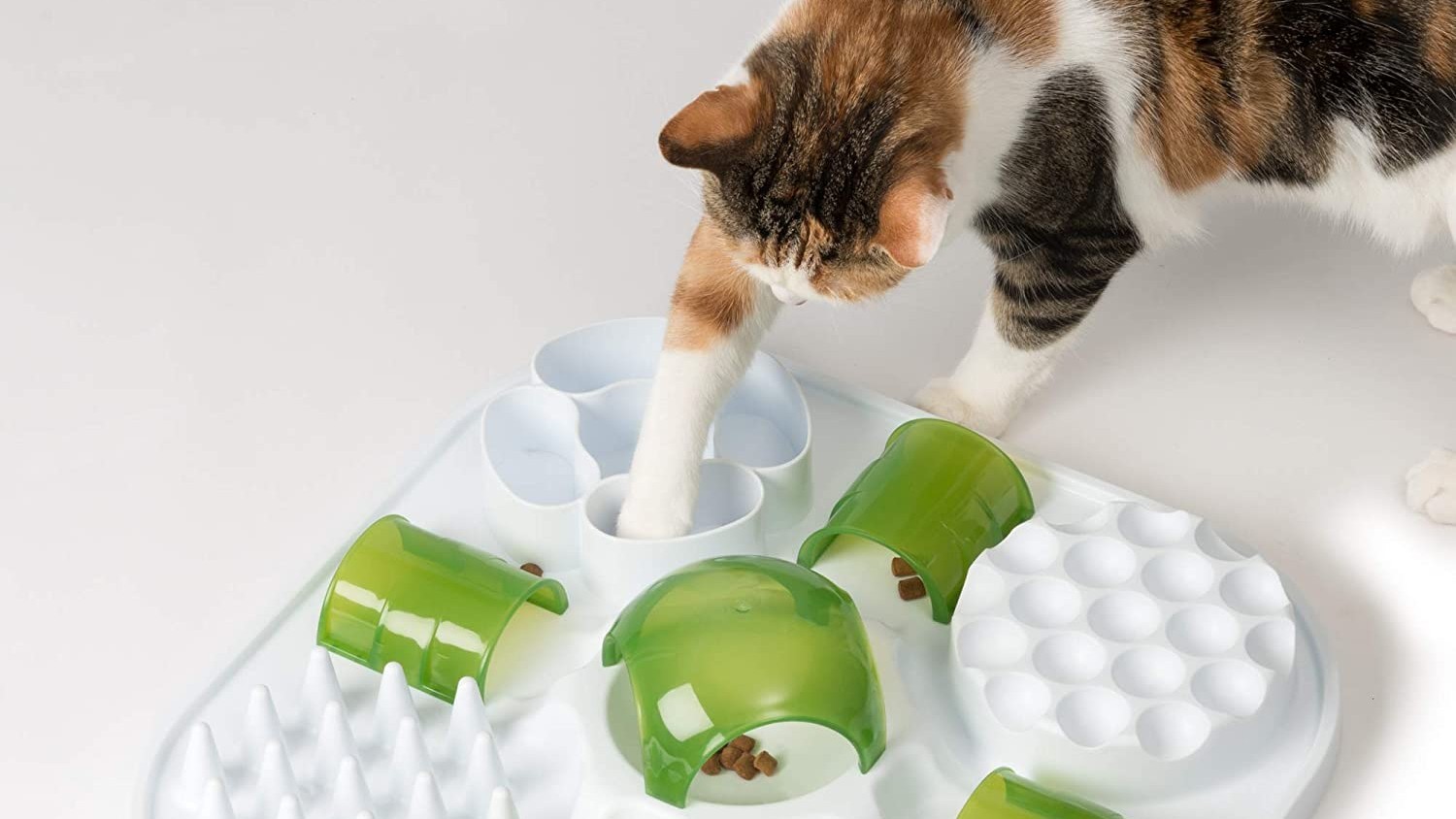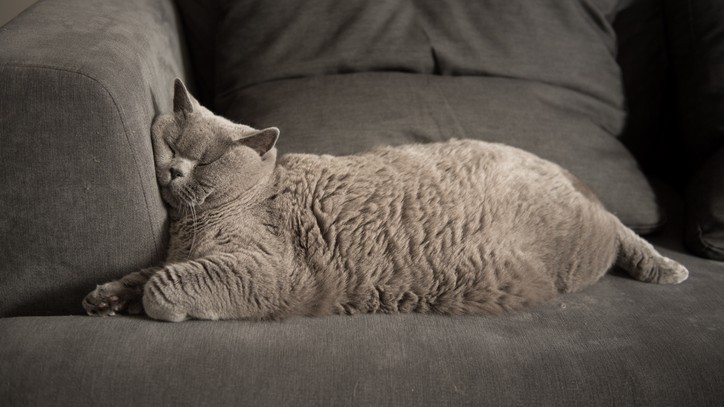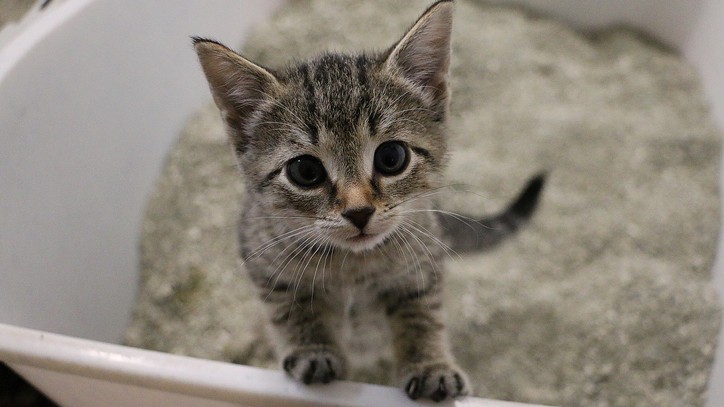Nine reasons to use a cat puzzle feeder toy from our expert vet
Have you discovered these benefits of using a cat puzzle feeder toy for your cats?

Cat puzzle feeder toys are a relatively new concept, but they’re quickly catching on and joining the list of the best cat toys owners can buy. After all, the importance of cat play is well documented as providing for the mental and physical health of our companions – and the great thing is, puzzle feeders can do both of these things!
The idea of ‘enrichment’ – enabling animals to experience natural behaviours by providing toys and habitats to allow them to do so – started off in zoos. Animals in captivity can easily become bored, but allowing them to practice behaviours like hunting, climbing, foraging and playing can improve their lives drastically. Food enrichment for dogs can be very beneficial and the same is true of our domestic cats.
In 2016, a paper was published in a veterinary journal highlighting the importance of puzzle feeders for cats, and we vets are now recommending puzzle feeders to pet parents for a range of behavioural problems, even in healthy cats.
- The best dry cat foods: King of cat kibble revealed
- The best wet cat food: From daily dishes to tasty treats
- Best kitten food: Six types to feed your new furry feline friend
What is a puzzle feeder toy?
Puzzle feeders are devices that release food once the cat has figured out the ‘puzzle’. They can be as simple and cheap as an egg carton that needs to be knocked around to release all the kibble, or as complex as a plastic box with pieces that slide back and forth to reveal biscuits. Some puzzle feeders for cats are designed for wet food, but most are designed for dry food. There are many cat puzzle feeder toys on the market, and they are often rated in terms of difficulty. It’s a good idea to get several – the point is to challenge your cat without frustrating them, so moving up through the difficulty levels rather than going straight for the hardest is important. In addition, rotating the puzzle feeders can keep each one seeming new rather than becoming boring.
Reasons why you should use a puzzle feeder toy for your cat
We’ve already said it’s important for your cat to be able to express his instincts. This is particularly true if you have an indoor cat who isn’t otherwise able to hunt and forage for food. Here are some of the reasons that a puzzle feeder might benefit your cat.
Puzzle feeders keep your cats ‘fuller for longer’
If you have a greedy cat that constantly pesters for food, a puzzle feeder might be a good idea. Just as in humans, slowing down your cat’s eating is a good way to help them recognise that they’re feeling full. They’ll also be less likely to pester you for food if there’s food remaining in their puzzle feeder!
Cat puzzle feeder toys can help reduce stress and anxiety
Many cats living in our homes suffer from hidden stress and anxiety. Cats, being prey animals, are scared of things that change in their environment, like moving furniture, new people, and changing routines. Since we can’t always avoid these changes, helping cats by giving them coping mechanisms is important. Puzzle feeding toys are one of a range of changes you can implement to help cats cope with stress.
Puzzle feeders can help to reduce fighting amongst cats
Cats are naturally solitary creatures and can dislike being kept together. Whilst cat-cat bullying is often too subtle for owners to recognise, some cats will show obvious aggression to one another expressed as hissing and fighting. Puzzle feeders have been used as part of an enrichment plan to reduce cat fights in the home. The food reward from using the feeder can even help to positively reinforce good, co-operative behaviours in cats.
Toys increase activity to keep your cat slim and trim
Obesity is a growing problem in cats, currently affecting nearly 50% of our domestic pets. It can lead to health problems such as arthritis and diabetes, severely affecting cat welfare. Puzzle feeders not only increase satiety, they also increase activity. Every time your cat moves, he expends calories, which – over time – will help to encourage weight loss.

Cat puzzle toys might hold off feline dementia
Feline dementia (cognitive dysfunction) is fairly common in elderly cats. Affected cats may cry more than usual, pace, and be noisy at night because their sleep patterns change. They may not recognise their owners or may develop a close attachment to them due to anxiety. As with humans, it’s thought that keeping a cat mentally active in their old age can stimulate the growth of new neurons in the brain and slow the spread of dementia. Food puzzles can help to stimulate your cat mentally.
Puzzle feeders can help to decrease behavioural problems in cats
It’s hard to say how many abnormal behaviours come from boredom, but it’s thought to be a lot. Just as with children, keeping cats busy and tired is the best way to keep them out of trouble! In the wild, cats would spend a large amount of their time hunting for food. In our homes, they can finish a bowl of food in seconds, leaving the rest of the day disappointingly empty! One study suggested an improvement in behaviours such as fear aggression, noise phobia, and boisterous play.
Using a puzzle feeder may reduce regurgitation in cats
Some cats ‘scarf and barf’, the non-technical term for eating their food too quickly and bringing it straight back up again. This is particularly true of cats fed only once a day, and cats on wet food. If your cat regularly vomits or regurgitates their food straight after eating, slowing them down can help. A puzzle feeder is a great way to slow your cat’s eating down to give their stomach a chance to receive the food in more normal quantities.

Puzzle feeders may help cats with urine problems
Urinating outside of the litter tray can be for a number of reasons, but the most common is anxiety. This anxiety can also lead to feline idiopathic cystitis, which can cause blood in your cat’s pee and uncomfortable urination. Puzzle feeders can be used as a part of an enrichment plan to improve your cat’s anxiety and reduce urination problems.
Puzzle feeders can reduce spraying and scratching of furniture
Spraying is a marking behaviour – it’s a way to mark territory to warn other cats to stay away. Scratching furniture also works to tell other cats whose house this is. When cats are worried about their territory due to new cats in the neighbourhood or other cats in the house, marking behaviours can increase. Food puzzles help your cat to feel more in control of his life and territory, as well as improving mood and reducing anxiety.
Puzzle feeder toys are great for cats
Keeping your cat happy is a pet parent’s most important job. There are lots of benefits to using cat puzzle feeder toys in cats, from keeping them physically fit to helping protect their brain from ageing. As a vet, I recommend getting a range of food puzzle toys for cats.
Looking to get creative in a way that will benefit both you and your feline friend? These adorable DIY cat toys will save you money and keep your kitty entertained at the same time.
PetsRadar Newsletter
Get the best advice, tips and top tech for your beloved Pets
After graduating as a vet from the University of Nottingham, Dr Joanna Woodnutt went on to practice companion animal medicine in the Midlands. Since then, she has also written for countless online and print publications and is a regular contributor for Edition Dog Magazine.

